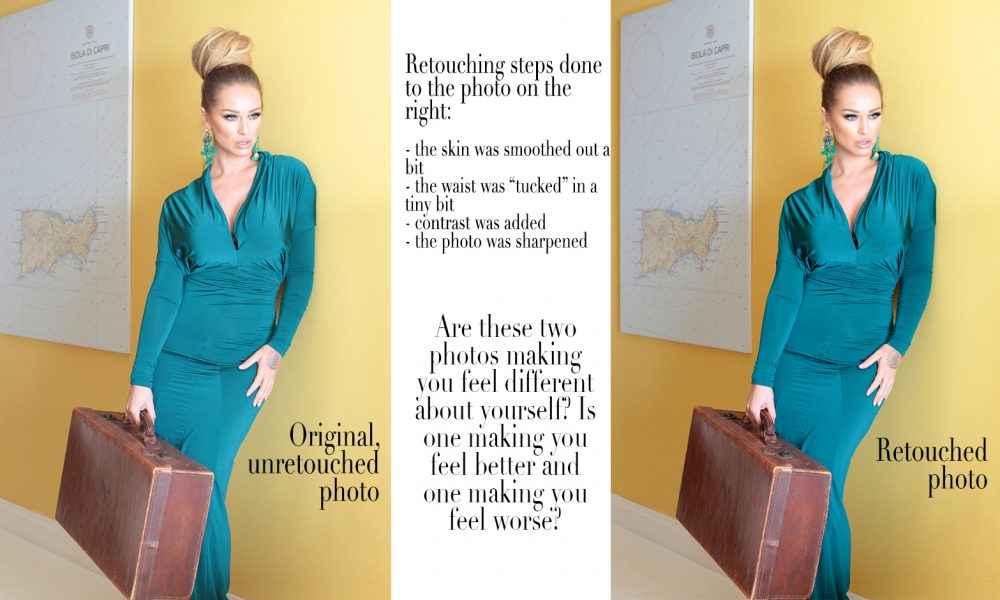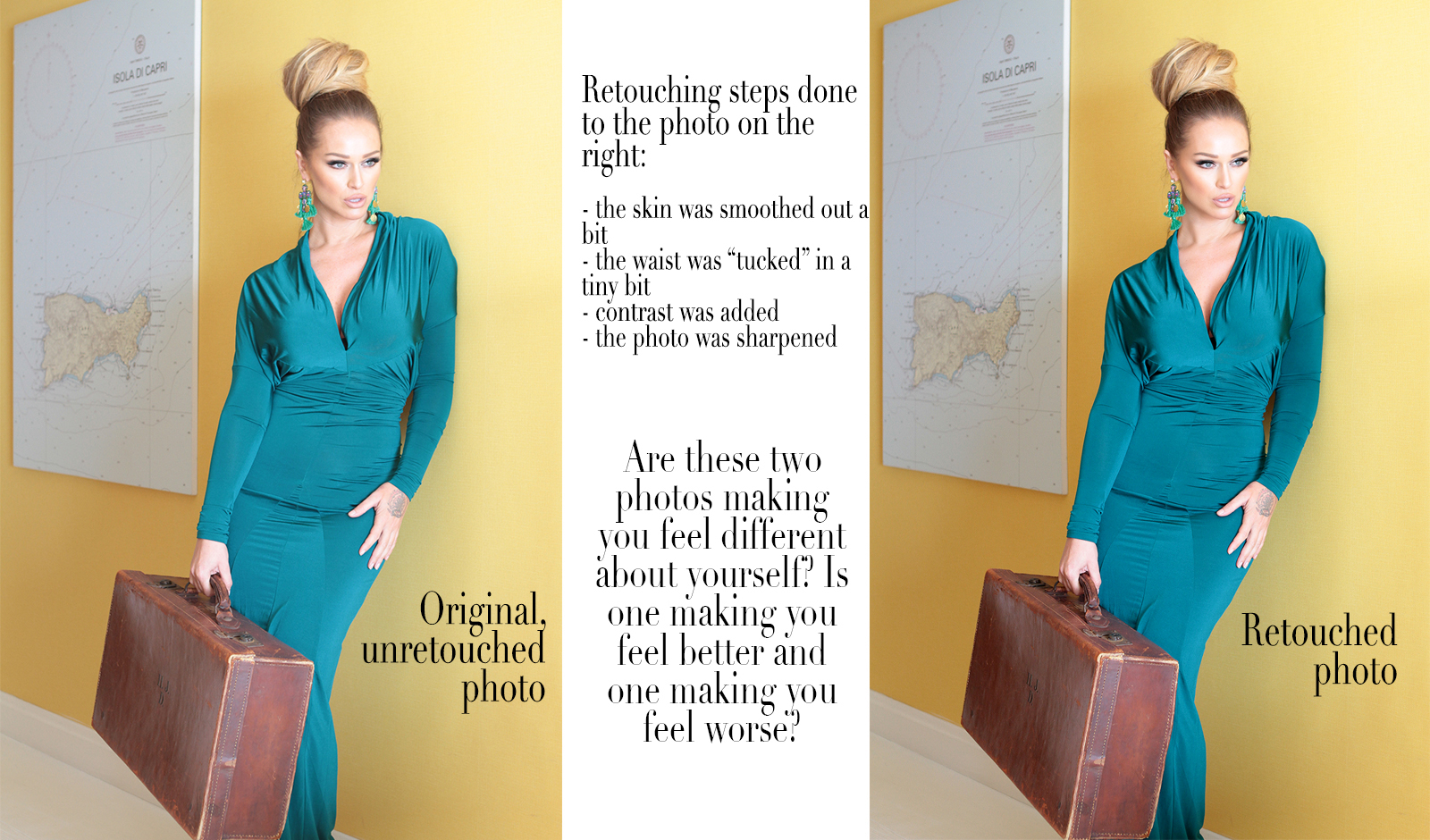

Should Retouched Images Have Warning Labels for Consumers?
In the past, magazines would get bashed for publishing retouched photos because doing so could be sending the wrong message to consumers. Some people may feel more insecure about themselves or less-than-worthy when they compare themselves to a retouched photo of a beautiful woman. Personally, I’ve never felt insecure because of that. And I did compare myself to photos of MANY beautiful women.
Instead, my insecurity developed from the everyday people around me who kept telling me that I was nothing, that I wasn’t pretty, that I was fat and short, etc. It was their perception of me, their jealousy, and their hate that affected how I felt about myself. I felt less-than-worthy because I got rejected by boys that I liked that didn’t like me back. It was fashion magazines that became my escape to the “perfect world,” giving me hope that I could look better, that I could become “something,” and that I could be worthy.
There was a day when I tried to re-create a smoky-eye look that I saw on a beautiful model in a magazine for the first time, and that was the day that changed my life. I was 18, and I turned into her. Everyone’s perception of me changed. Fashion magazines have always inspired me to try new and different things and played a big role in my life. They’ve helped me to overcome my insecurities.
Since social media has taken over the role of magazines (and the media, in general, in our society today), more and more people have started to question retouching apps. Anyone can download one of these apps to their phone, and some of them are even free. Some of them offer more than just filters, adding cool effects to any photo. Many of them have the ability to completely alter a photo and are more user-friendly than Photoshop, which is used more in the professional field. In short, anyone can drastically alter any photo they post.

Unretouched Instagram selfie
So, while there’s still talk regarding whether retouched ads should have a warning label for the consumer going around, my question is: Should we then label all the retouched images on our social media to let our followers know “I retouched this photo”? Because most of us are advertising something. This is where I can see an issue, because social media and the obsession with over face-tuning photos have become an epidemic. These days, images from social media have the biggest effect on how people feel about themselves– not print or TV ads.
No wonder about 30% of users have already left social media. Did you notice a decrease in your social media following?
If the issue is that retouched images are not reflecting reality, then perhaps we shouldn’t even wear makeup or have our hair and nails done before we take photos. An image with skewed reality starts with us not being bare in the photo. In that case, all photos would be “documentary style”, and we wouldn’t create art with photography.
That doesn’t sound like a move in the right direction, to me! At that point, I think photography would be super boring, and we wouldn’t have as much fun in life.

This photo has been retouched.
And what about video? Almost all music videos, movies, and TV shows are “retouched”. Should we label each frame so the public is warned that the sky in that video was turned more blue in post-production?
That sounds silly to me.
With the pixel-based, HD, 4K and even 8K technology, we start to see “flaws” that are not visible in real life.
I realized this one day when I did makeup on Cheryl Burke. She is young with great skin and cute freckles. I did her makeup for a TV appearance, so the makeup coverage was pretty strong. In person, she looked flawless, and her face was very even. However, once her face popped up on my TV monitor backstage, I couldn’t believe my eyes. I could see all her freckles that I covered up along with spots I didn’t even notice she had. And I pay close attention to detail! The digital technology that we use today literally pulls spots out of your face and body. Of course, Cheryl still looked beautiful and “flawless”, but the point is, the camera showed more than the human eye saw in real life. This experience made me realize how evil the pixel-based technology is compared to the rolls of film that we used to use. And that sometimes retouching helps to bring photos closer to what we see in reality.
If the government decides to make it mandatory to label retouched photos/ads, then perhaps we should also list every retouching process that’s been done to the image. If we don’t, the consumer is going to be left in limbo wondering, “Hmmm, what has been done to this image?” Their assumptions can be completely wrong, and in that case, it would still be false marketing and misleading to the consumer- just in a different way. Because there is no difference between whether the photo only had colors adjusted, the model had a wrinkle removed, or the whole image was completely changed with retouching.
It is still considered retouched.
So, is labeling retouched images necessary, and does it even do anything?
Not that long ago, I saw a L’oreal ad that came with a note that said something along the lines of, “This image has been retouched.” Honestly, reading it didn’t do anything to me. I still liked the photo of a beautiful model who looked better than me. Knowing that the model is not perfect didn’t make me feel better about myself. I appreciated the beauty of the image. If anything, it had a very positive effect on me; it was bright, colorful, and beautiful, and it was sending out good energy.
If we see a commercial shot in a magazine, on a billboard, or on TV, I think it’s safe for everyone to assume that the image has been altered in some way for a more pleasing effect. It’s called marketing. When McDonald’s uses their slogan, “I’m Lovin’ It”, we automatically know it’s just marketing. I, personally, don’t love McDonald’s nor its food, but if they want to use that slogan, I’m not going to get upset and request that they label it with, “This slogan is not true.” or something like that. Another example is Disneyland. It is not MY happiest place on earth. But I don’t mind the company using it in their slogan because I know it’s just marketing to pull people in. There is nothing wrong with that. Just like I don’t see anything wrong with retouched ads that are trying to sell something.

This photo has been retouched.
So, perhaps we, as a society, should look at ourselves and try to figure out what is really making us feel upset and bad about ourselves and what’s making us feel insecure or less-than-worthy. Is it the fact that our parents got divorced when we were young? Is it because we got bullied for speaking up on social media? Is it the lack of love and support we’ve received growing up?
I believe it is our own underlying issues that cause our perception of others, including in photos, to be so negative. It could be our lack of education, lack of museums visits, or that we didn’t grow up in an area with rich history that gives us a lack of appreciation for art-because that’s what photos are. And art, as we know, is subjective.
So, go out there and see that beauty is everywhere! Try not to over-analyze silly things such as marketing. There is no universal truth, so just remember that we don’t see things as they are, but we see them as we are.

Unretouched photo.






















